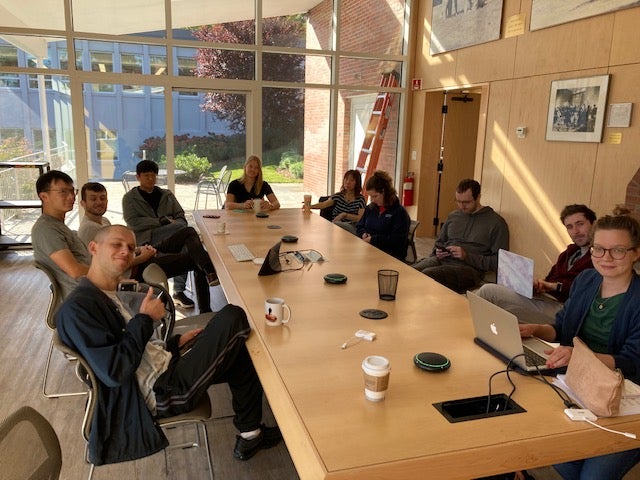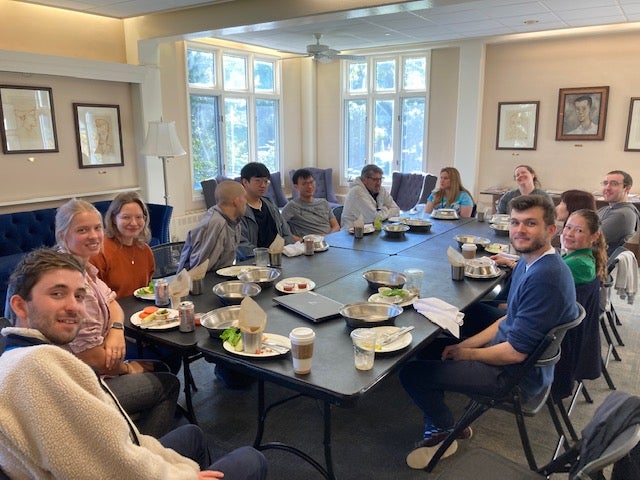Art work by Tomoyo.
Mentorship
The mission of the Furukawa lab (HF Lab) is to make fundamental contributions to the field of molecular physiology (especially neuroscience) and biophysics (such as structural biology) as it fosters the next generations of successful scientists. The current and previous members of the HF Lab are from various backgrounds. They are highly collaborative, energetic, talented, and interesting. The HF lab members work on intriguing questions in science in collaboration with HF (the PI). Therefore, the relationship between the HF_lab members and HF is bilateral.
HF is committed to preparing and facilitating the lab members to achieve their scientific and career goals (short-term and long-term) and offering support beyond their time in the HF lab. Formulating a successful career requires hard work and extensive mentoring. How to identify questions, formulate projects, acquire funding, make discoveries, interpret and present data (publication and giving talks), teach students at all levels, etc., while maintaining a work-life balance? HF will figure them out with each HF_lab member. Proactive and extensive interactions between the lab members and HF achieve this. Specific training plans are tailor-made for each lab member based on career goals at different stages (for example, third-year postdocs/students require different mentoring from the first-year ones). HF and each lab member meet 1-on-1 once a week, but they chat and frequently interact outside official meetings. The HF’s door is always open for all the HF lab members to discuss science, career, and life. The former members took their desired next steps after training in the HF lab. Please read “Science and Training” (below) to learn more about specific training items.
Various perspectives
The HF lab considers various unique perspectives the crucial factor for creating an innovative environment full of energy. HF (the PI) appreciates this more than anything because people from different backgrounds in different countries educated him. The HF lab believes that multiple perspectives and purposes boost creativity and motivation in science. For example, scientists from various backgrounds naturally have their own unique objectives and reasons for conducting science. We support scientists from all backgrounds. The HF lab works towards full equality of opportunity by providing learning resources for everybody to succeed. We are constantly seeking better ways to achieve the goals above to maximize our scientific productivity.
Science and Training
HF Lab Philosophy
As described in “Research,” our general biological interests revolve around the cellular paradigms in neuroscience, such as neuroplasticity and neurodegeneration, which are mediated by changes in membrane potentials and protein-protein interactions. Most of our research projects involve structural biology/neuropharmacology of membrane-embedded receptors and interacting signaling molecules.
However, unexpected cross-talks between different areas of biology often result in important discoveries, so we stay open-minded. For example, we collaborate with cancer biologists and plant biologists at CSHL. Also, science is constantly evolving, so we always seek to add or invent new technologies if they are inevitable in answering our scientific questions. HF will seek funding for necessary equipment and resources to help with innovative research the HF lab members conduct.
Human interactions, not web browsing or chatting with GPT, generate inspiration, innovation, and creativity. Frequent scientific conversations with HF and the HF lab members over coffee, tea, etc., make a tremendous difference in research progress. It is essential to stay interactive on both sunny and rainy days to drive science forward logically and efficiently. One random/unexpected discussion can become a game-changer in your career.
Embrace the thrill of discovery in academia! This extraordinary profession offers a platform for continuous learning and uncovering unprecedented insights. Seize every opportunity with pride and a sense of purpose.
Examples of Specific Training Tools
1) 1-on-1 weekly meeting with HF
2) Weekly lab meetings
3) CSHL in-house seminar series
4) Cryo-EM journal club
5) Institutional seminar series and interactions with the speakers.
6) In addition to interactions within the HF lab and CSHL, scientists in the HF lab have the luxury of interacting with visitors in the CSHL meetings and courses. They provide fantastic opportunities to connect with scientists from all over the world. Scientists in my group are eligible to participate in the lectures. If necessary, they can officially participate in the courses. The courses include cryo-EM, X-ray crystallography, Ion Channel (electrophysiology/imaging), Neuroimaging, Single-cell technology (e.g., display technology), etc.
7) The CSHL grant office offers writing courses where students and postdocs can learn professional writing skills (e.g., grant writing).
8) Presentations at Conferences and Meetings (e.g., Gordon Research Conferences, Biophysical Society Meetings, CSHL meetings, etc.).
What it’s like to be an HF lab member
- Postdoctoral Fellows in the HF lab have been highly successful. The current members are energetic, communicative, and mature. They formulate projects and discuss science with HF frequently (at least once weekly). They serve as positive role models for students. They have opportunities to mentor graduate students and undergraduate summer students. The HF postdocs are encouraged to present in the Cold Spring Harbor Laboratory in-house seminars (an institution-wide seminar series) after spending ~3 years. The in-house seminar series (attended by students, postdocs, and faculties) offers an excellent opportunity to practice presentation skills and share scientific ideas with the CSHL community. The HF postdocs work with HF to apply for at least one postdoctoral fellowship to practice project formulation and grant writing before or after joining the HF lab.
- Graduate Students in the HF lab have tremendous success in their scientific accomplishments and subsequent careers. Every student has at least one independent project. Typically, students and HF work together with a postdoc to formulate and conduct exciting Ph.D. projects. The HF lab students will obtain hands-on education from HF and the very talented HF lab postdocs. Students also get support to prepare for graduate school symposiums and other presentations. And importantly, they obtain extensive career guidance.
- Technical Staff/Research Assistant. Although a broadly accepted view of a lab technician is mainly to support students and postdocs, an independent project can be pursued if she/he chooses to do so in the HF lab. The quality of experiments conducted by technical staff is critical for our overall success. The HF lab technical staff are highly talented and communicative with postdocs and students. For example, Noriko can run many experiments at a high level HF can never achieve (!)
Pasteur’s amazing accomplishments.
Priceless!
Lab meeting
Lab meeting
Lab meeting is a powerful mechanism for training. Productive meetings are keys to the success of the HF lab members. Presenters share their raw data in our lab meetings with the lab members. The purpose of our lab meetings is not to “show off” your “positive” data (what is “positive” data anyway…?) but to discuss the validity of raw data, data analysis, data interpretation, and research directions. We present data clearly to facilitate constructive discussions among the HF lab members. We maintain our “positive” attitudes to help each other most logically. The HF lab scientists teach each other how to present data, listen, and ask questions.
Lab lunch





![20161020_165603[1]](https://furukawalab.labsites.cshl.edu/wp-content/uploads/sites/16/2014/04/20161020_1656031.jpg)
